Shabbat Gathering: "Are you a Jew?"
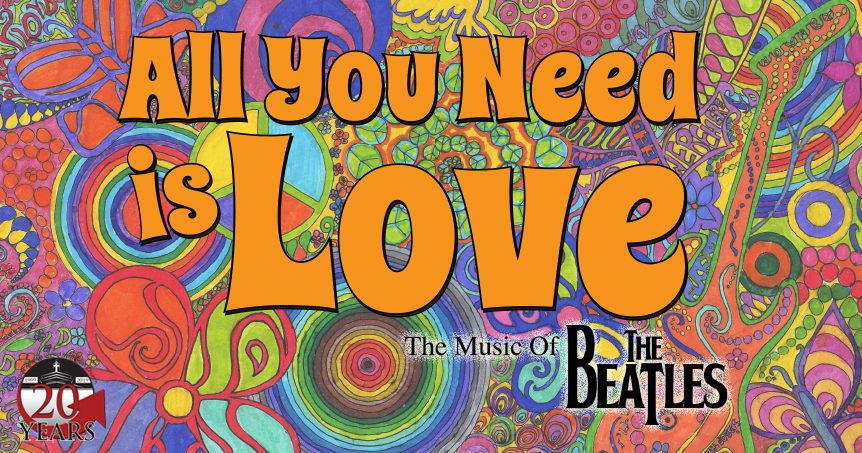
Dear Chevra, as is our custom, we will gather tonight at 5.45p ct to welcome Shabbat. These are the coordinates:
Zoom
Meeting ID: 963 5113 1550
Password: 1989
Phone: +1 312 626 6799
(To unsubscribe from the newsletter, click the link at the very bottom of this email.)
Trigger warning: Antisemitism, Shoah. This was a hard newsletter to write. Thank you to a dear friend for guidance.
Here we go.
When I look at our Zoom screen on Friday nights, I see Jews, people who are converting to Judaism, and people who are Jew-curious. And I love you all just the way you are. You're my friends. And for some of you, I don't know where you are on your path but wherever it is, I wish you well. No matter where we are on our paths, by dent of the fact we're showing up in a Jewish space, there is a reckoning when the existential stakes of being a Jew become crystal clear. For me, the first time came in 1990 in Amsterdam. This newsletter is about my reckoning with antisemitism then and my continued reckoning due to a confluence of current events.
Amsterdam, 1990.
My ex-wife and I had planned one last great adventure for ourselves before settling down in our posh NYC suburb and having children. I had an infinite number of frequent flyer miles from commuting twice a week to and from NYC and Boston for a few years. We loaded a large backpack and off we went to Amsterdam. I had been to Amsterdam before and knew it offers tremendous cultural treasures as well as a veritable Disneyland for very naughty children.
We arrived at Schiphol airport refreshed and in good spirits from flying first class. I shouldered our backpack, we got out our passports, and we got in line for customs. When we reached the uniformed customs officer, we handed over our passports and prepared ourselves for the usual questions, “Why are you coming to the Netherlands? How long will you be staying here? Do you have anything to declare?”
After looking at my ex’s passport, the customs officer asked her, “Are you Jewish?” The questioned chilled me. I don’t think that either my ex-wife or I remembered the Israeli stamps in her passport from her birthright trip to work on a moshav. Now, we were standing in front of a uniformed officer, surrounded by guards carrying submachine guns, in a foreign country. It was a far cry from the place of privilege we had just left: the posh suburb, living in a part of America where being a Jewish American was considered ordinary, the first class seats. Right now, we were facing what felt like antisemitism in a land where our privilege had evaporated.
OK. As far as it goes, the custom officer's question was pretty innocuous. It wasn't as if he escorted us to a private examination room or arrested us or even sneered. I should be able to write off his question as maybe just making polite conversation. But in a moment where the power dynamic was completely in his hands, the question frightened me. Gentle reader, I apologize if I'm over reacting, but this is what was on my mind.
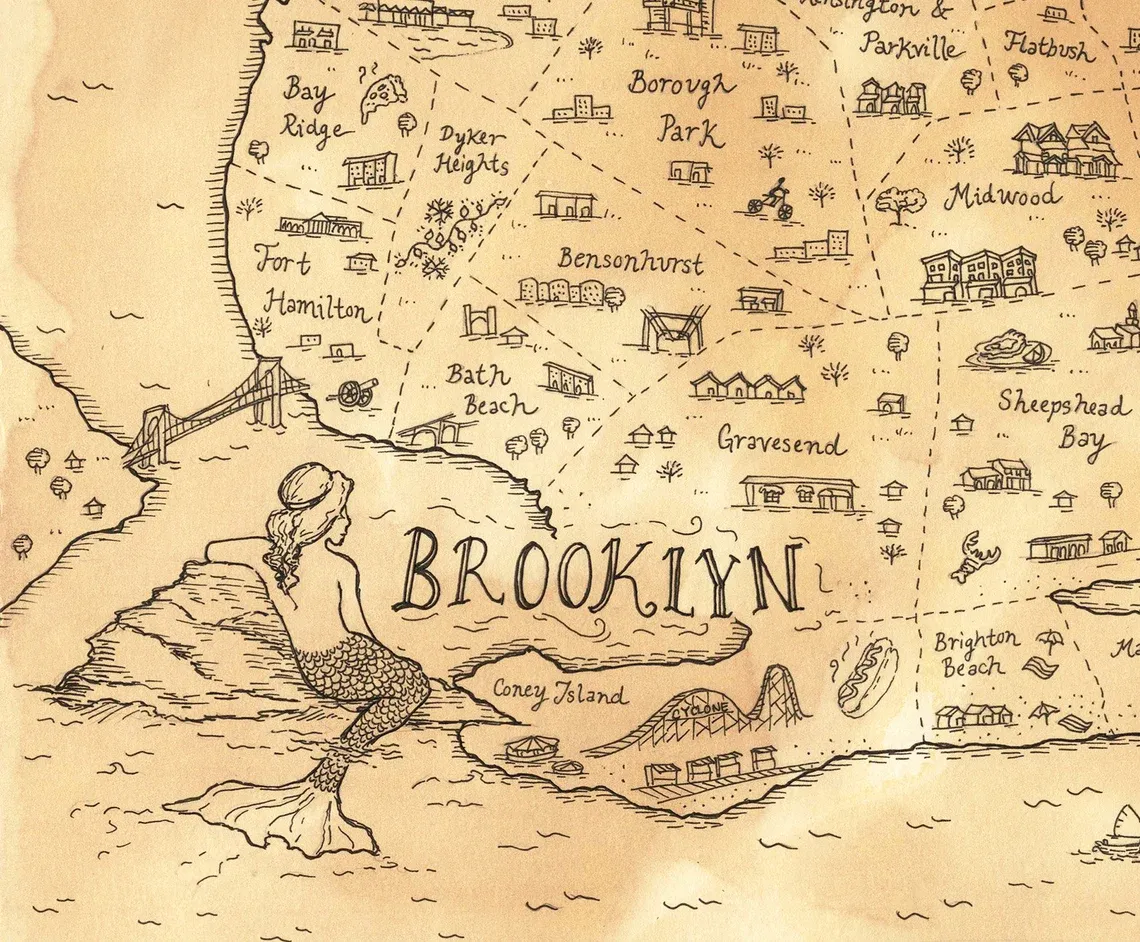
My conversion was more than a decade away, but I had cast my lot in with a barely assimilated, first and second generation Conservodox family of Jews from Brooklyn. My ex has a Brooklyn accent so thick her parents considered making her go to speech therapy. But it wasn’t just her accent, it was also the Yiddish she regularly uses that makes her so obviously a Jew. And it’s her entire being too. Having spent a long summer working on a moshav, she was a Zionist Jew through and through. And she believes in the one true G-d. She was assimilated by New York City standards, but when I took her home to Arkansas to meet my parents, they regarded her as if she was from a different planet.
It seemed as if the custom officer’s question hung in the air for minutes, but my ex replied in a split second. “Yes. I'm a Jew,” she said firmly with that New York City attitude. It was the bravest thing I had ever seen her do (until she gave birth to our daughters). “Enjoy your trip,” the smiling customs officer replied as he handed back our passports.
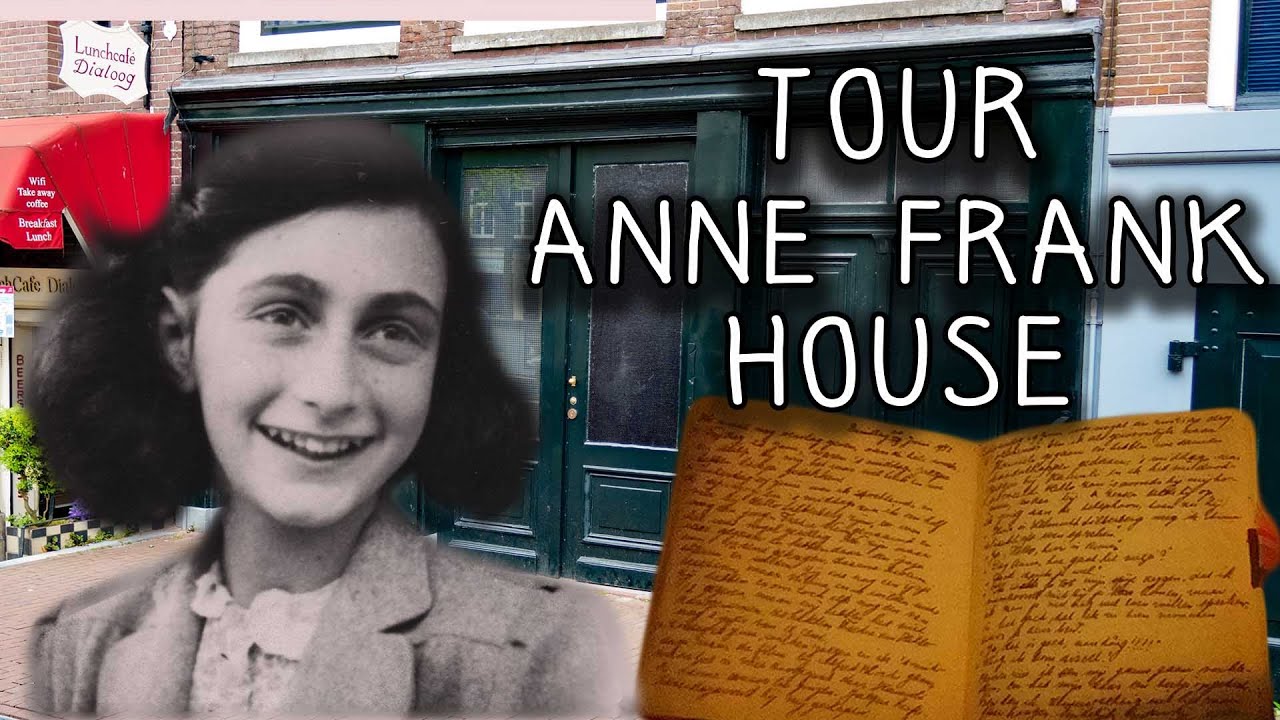
We ended up having a great time in Amsterdam. We saw the museums. We spent a very long time in the Anne Frank house. And we did a few naughty things too. It was a great trip. But one of the most vivid memories I have from the trip is that question the customs officer asked. For me, it was among the first, sharpest moments of reckoning with antisemitism in my journey to become a Jew. The customs officer may not have meant it to be antisemitic, but that’s what I heard.
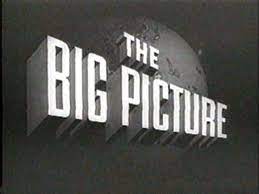
Even before I joined a Jewish family, I had consumed some media about the Shoah. When I was a child, the local TV station in Arkansas aired a propaganda series produced by the US Army Signal Corp. called “The Big Picture.” The series was made to persuade soldiers (and the American people in general) about how important it was for America to fight communism and fascism. Several episodes focused on the Shoah. It was my introduction to the Shoah, and it was grim.

Before I converted, I read Night by Eli Wiesel. It’s the darkest book I’ve ever read and shook me to my core. It changed me. I had grown up in a post-hippie world where “All You Need is Love.” After reading Night, I realized there were times when it might be necessary to pick up a gun and fight for one’s life against antisemitism, or die trying. Really.

Years later, when I formalized my conversion, Beth Jacob, the synagogue, where I had my beis din and went to mikvah, was firebombed the night before. The playground was burned down. The air in the synagogue was filled with the smell of smoke. Rabbi Laura Winer asked me if I really knew what I was getting into, if I was prepared for the possible consequences. I understood that becoming a Jew brought with it the very real possibility of … all the horrors. “Yes,” I answered. “I was at Sinai. I am a Jew.” I regarded the beis din as merely filling out the paperwork necessary to making my identity official but again it brought into sharp focus again the threat of antisemitism to me and my family.
In 2016, when Trump was elected president and I was living in Madison, I felt that existential dread wash over me yet again. I decided it was time to "man up" against antisemitism, put on my kippah, and continue to wear it all the time. It was my way to try to be the person my ex-wife taught me to be when she answered the custom’s officer question. “Yes, I am a Jew.” Got any problems with that? I wrote an article about the experience that was the first thing I had published in the Forward.
Now, Biden is president and the U.S. is more divided than ever before. And Jews are in even more peril. "Jews will not replace us," was the chant in Charlottesville on August 11, 2017. On October 27, 2018, eleven congregants were killed at the Tree of Life synagogue in Pittsburgh. In 2022, there was the hostage event at a synagogue in Texas. Now, Donald Trump is trying to drive a wedge into America's small Jewish population and divide us on our support, or lack thereof, for Israel. Israel is a "hot button" for American Jews, and Trump knows this. Dividing Jews in America makes us even weaker and that's Trump's goal when he pushes out statements like this on his social media platform.
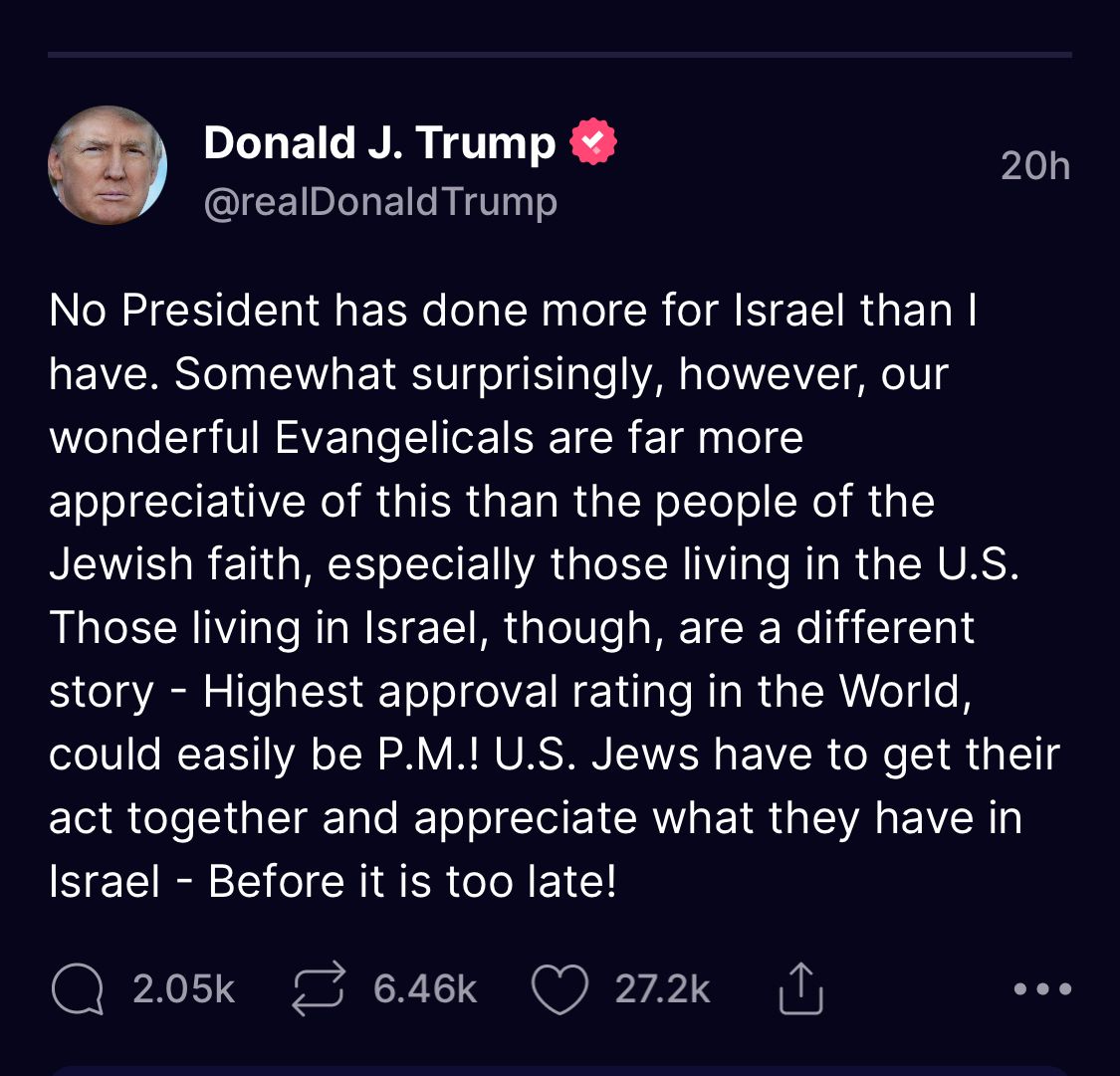
And don't even get me started on Kanye "Ye" West.
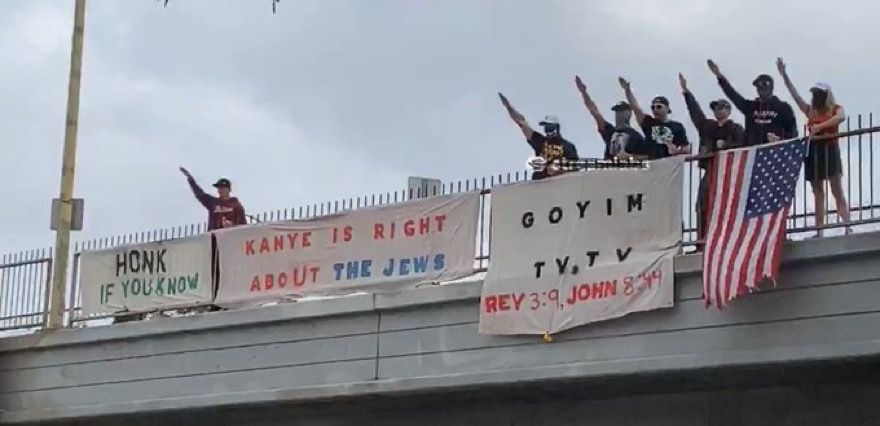
Here in Arkansas, I don’t get out much at all. Basically, I’m a shut-in due to my responsibility to care for my mother 24x7. And when I do go out, I still wear my kippah (and a mask). Few ask me about my “hat.” As I’ve written before, there are a thousand more Jews in the city of Madison than in the entire state of Arkansas. People here have no idea what my kippah really means, but they do have opinions about Jews. While I was getting my third Covid booster, the nurse complimented me on my hat. "My hat's called a kippah. I wear it because I'm a Jew." And I can make a Very Well Informed guess that I'm the first Jew she ever met.
My mother is in the care of hospice and, as part of her care, a chaplain comes by the house. I thought this was a good idea because my mother was raised in the church and is a devout Christian. What I didn’t expect the chaplain quizzing me about my own religious beliefs. When the chaplain learned I’m a Jew, she discovered an opportunity to “witness” to me and try to save me from “the eternal fire of hell.” Her exact words. Inside, I had strong objections to this expression of what I believe is antisemitism. Outside, I didn’t voice those objections for the sake of shalom bayit, peace in the home. If the chaplain comes back, we’ll have to have a conversation about how I’m not going to be another notch on her belt of people she’s “saved.” And if there is a harsh exchange of words about this, Mom’s dementia will wash away the memory in 15 minutes.
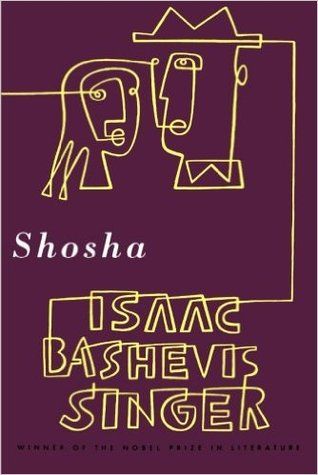
Currently, I’m reading a novel by I.B. Singer, Shosha. I’m about half-way through. It’s set in Warsaw. We’ve covered the period beginning immediately before World War I and now World War II is starting. The characters in the book, including the naïve girl of the title, Shosha, know very clearly what’s coming. The novel is a love story with a huge shadow of antisemitism hanging over it. I feel like I know how the story ends, but I want to find out what will happen to Shosha. There’s a chance she’ll escape. There’s a better chance she won’t. It's hard to read.
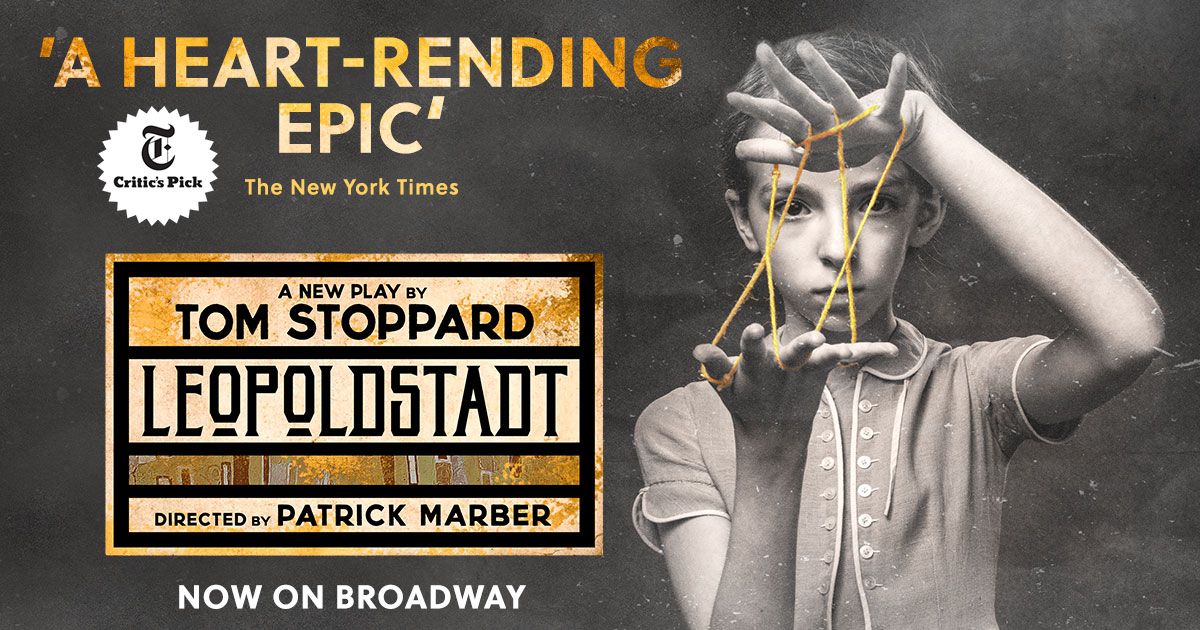
My favorite living playwright, by far, is Tom Stoppard. His latest play, Leopoldstadt, opened on Broadway October 2. It’s set in Vienna before, during, and after the Shoah. It follows generations of a large assimilated Jewish family. It doesn’t end well for the family (understatement). I’ve read the play and the ending made me weep.

Ken Burns has a new documentary about what the United States did, and didn’t do, regarding the Shoah. I’ve watched the first episode and it made me cry. As with Shosha, I feel like I already know the story and I don’t want to see the rest of the film with its horrific footage. But I’ll watch it all eventually, but not just yet. I’m not prepared for another trauma of antisemitism.
I apologize for being so dark. Last night I had a dream about that trip to Amsterdam. And I’m reading Shosha. And I’m reading the rave reviews for Leopoldstadt. And Trump keeps hounding Jews. And the Ken Burns film is waiting for me. Perhaps I’m a victim of my temporary environment, but the issue of living with the existential reckoning of being a Jew is part of our permanent environment of antisemitism that stretches back for millennia.
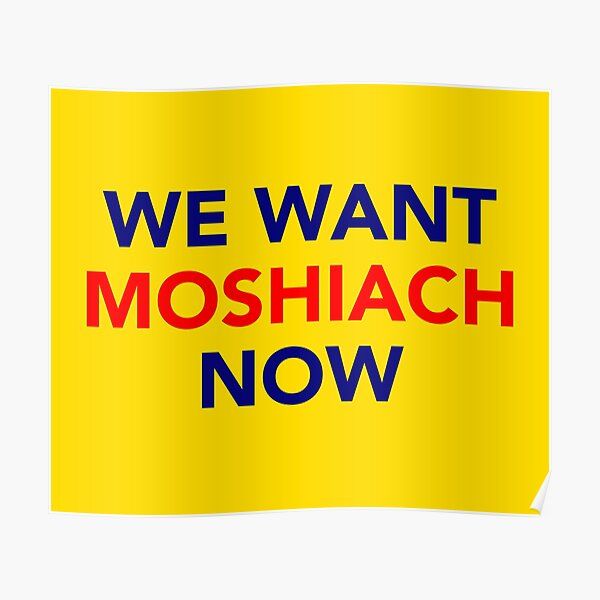
After all these centuries, it’s unclear whether or not antisemitism can be eliminated. I suspect antisemitism will stay with us until Moshiach comes to deliver us. I think there are three things we can do in the meantime to help us confront antisemitism. We can be aware of the problem and take courageous steps as necessary. We can reach out our hands to gentiles and try to show them that Jews are humans and American citizens too. And we can join with each other. Whether you’re a Jew, someone who’s converting, or Jew-curious, there’s a place for all of us at Shaarei Shamayim. We’re the inclusive Jewish community in Madison. I believe that, as we wander through this very wicked world, it’s best to be in solidarity with each other than try to do this alone.
And may it be for all of us a blessing.
See you tonight!
Gut Shabbes!
All my love and in solidarity,
brian.
PS
Most of us are aware that, in the British Parliament, there's a custom of asking the Prime Minister questions. One time, during Benjamin Disaeli's tenure as Prime Minister (1868 and then between 1874 and 1880) he received the question about being a Jew. This is how he replied:
Yes, I am a Jew, and while the ancestors of the right honourable gentleman were brutal savages on an unknown island, mine were priests in the temple of Solomon.
Huzzah!